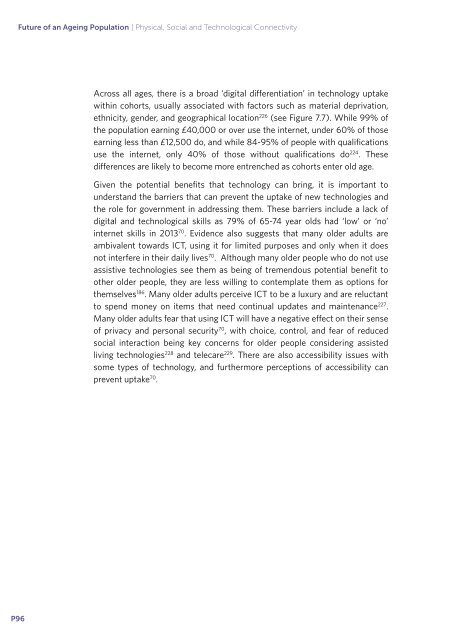Future of an Ageing Population
gs-16-10-future-of-an-ageing-population
gs-16-10-future-of-an-ageing-population
You also want an ePaper? Increase the reach of your titles
YUMPU automatically turns print PDFs into web optimized ePapers that Google loves.
<strong>Future</strong> <strong>of</strong> <strong>an</strong> <strong>Ageing</strong> <strong>Population</strong> | Physical, Social <strong>an</strong>d Technological Connectivity<br />
Across all ages, there is a broad ‘digital differentiation’ in technology uptake<br />
within cohorts, usually associated with factors such as material deprivation,<br />
ethnicity, gender, <strong>an</strong>d geographical location 226 (see Figure 7.7). While 99% <strong>of</strong><br />
the population earning £40,000 or over use the internet, under 60% <strong>of</strong> those<br />
earning less th<strong>an</strong> £12,500 do, <strong>an</strong>d while 84-95% <strong>of</strong> people with qualifications<br />
use the internet, only 40% <strong>of</strong> those without qualifications do 224 . These<br />
differences are likely to become more entrenched as cohorts enter old age.<br />
Given the potential benefits that technology c<strong>an</strong> bring, it is import<strong>an</strong>t to<br />
underst<strong>an</strong>d the barriers that c<strong>an</strong> prevent the uptake <strong>of</strong> new technologies <strong>an</strong>d<br />
the role for government in addressing them. These barriers include a lack <strong>of</strong><br />
digital <strong>an</strong>d technological skills as 79% <strong>of</strong> 65-74 year olds had ‘low’ or ‘no’<br />
internet skills in 2013 70 . Evidence also suggests that m<strong>an</strong>y older adults are<br />
ambivalent towards ICT, using it for limited purposes <strong>an</strong>d only when it does<br />
not interfere in their daily lives 70 . Although m<strong>an</strong>y older people who do not use<br />
assistive technologies see them as being <strong>of</strong> tremendous potential benefit to<br />
other older people, they are less willing to contemplate them as options for<br />
themselves 186 . M<strong>an</strong>y older adults perceive ICT to be a luxury <strong>an</strong>d are reluct<strong>an</strong>t<br />
to spend money on items that need continual updates <strong>an</strong>d mainten<strong>an</strong>ce 227 .<br />
M<strong>an</strong>y older adults fear that using ICT will have a negative effect on their sense<br />
<strong>of</strong> privacy <strong>an</strong>d personal security 70 , with choice, control, <strong>an</strong>d fear <strong>of</strong> reduced<br />
social interaction being key concerns for older people considering assisted<br />
living technologies 228 <strong>an</strong>d telecare 229 . There are also accessibility issues with<br />
some types <strong>of</strong> technology, <strong>an</strong>d furthermore perceptions <strong>of</strong> accessibility c<strong>an</strong><br />
prevent uptake 70 .<br />
P96


